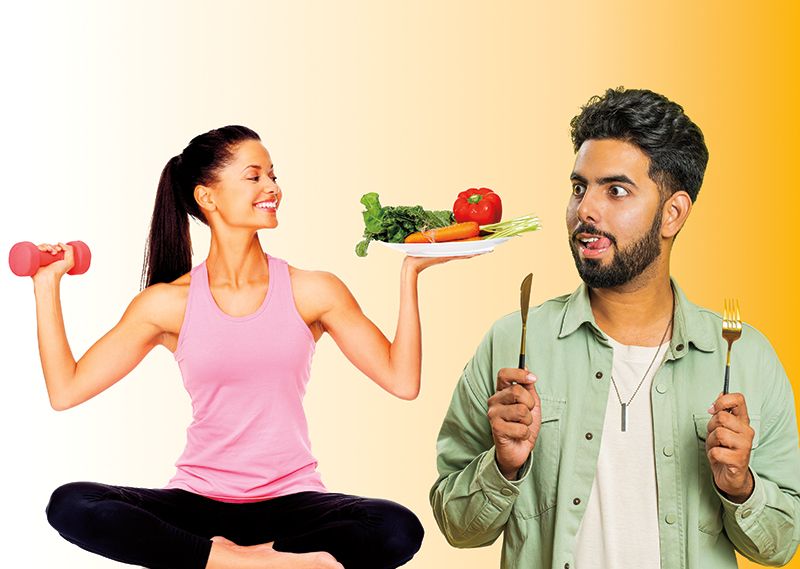Dal Chawal and South Asian Health – Achieving Wellness as South Asians
For the South Asian community, deciphering the intricacies of a balanced diet and effective fitness practices can be daunting. The journey toward optimal health involves far more than mere physical well-being. PhD student Vikshar Athreya discusses the key to nurturing health and fitness within the South Asian community.
“Pizza or Salad,” asks a common YouTube advertisement for a fitness program. Very often we find ourselves unsure of what to eat, how to exercise, and how to understand and manage our health. The internet contains 10 different opinions, none of which may have a factual basis, and in general, it can be hard to change a busy routine, as most in the community have.
So what then, is the goal of fitness? Is it to sculpt a body rivaling Salman Khan or Deepika Padukone? Is it to avoid the endemic heart and endocrine problems that plague South Asians? Is it just to live to 100 and to be able to see one’s grandchildren? These questions can only be answered individually, but I see fitness as a lifelong commitment to maintaining one’s body. Just as we take care of our responsibilities, meeting deadlines at work and doing chores at home, we must take care of our health as if it were a responsibility. Habits are worth a lot more than spur-of-the-moment actions, and if we want to be healthy, we have to maintain these throughout our lives. Studies show that parental obesity and metabolic disorders can predispose children to obesity as well, so it’s not just for our sake that we should think about being healthy.
Yet, while most people know to some degree that eating a healthy diet and exercising is good for you, it’s less often known how to achieve these habits. Especially so for the South Asian community, because it can be hard to understand how Indian foods such as “Dal Chawal” or “Paneer Tikka” fit in terms of a nutritional profile. As Indians, we may feel we are healthy because we eat a diet mostly free of fast and processed foods and usually avoid the significant obesity that we see around us in America. However, certain aspects of the South Asian diet and lifestyle do impact our health and fitness negatively, and it’s important to recognize and mitigate them.
One is a genetic disadvantage. A 2019 study found that low lean mass (i.e. body mass that isn’t composed of fat) in South Asians has ancient origins, suggesting that potential genetic differences predispose South Asians to larger body fat percentages. This means that South Asians are generally predisposed towards disorders we often think only afflict overweight individuals like type 2 diabetes or metabolic syndrome, at lower, even normal, weights and body mass indices.
The others, however, are diet and lifestyle disadvantages. Among vegetarians and non-vegetarians alike, South Asians tend to consume a larger amount of refined carbohydrates including rice and breads (think rotis, parathas, and puris). These tend to spike insulin levels and increase the risk of diabetes and other metabolic disorders. In addition, South Asians often work demanding, highly stressful professional jobs. Numerous studies not only show that stress leads to overeating, but that it spikes insulin levels, eventually leading to insulin resistance, diabetes, and other metabolic disorders.
I am not a dietician or a personal trainer. I am an aspiring neuroscientist who studies the effects of feeding and metabolism on the brain. Physical and mental health are completely intertwined for me. Thus, the solution to these problems to me looks a lot less like simple dietary advice like “avoid rice,” “go low carb,” or “stop being vegetarian.” It’s never as simple as that, and if we hate what we eat, we’ll eventually go back to old habits.
Thus, in order to fix these issues, we must adopt a more holistic view of what it means to be healthy. Sleeping an adequate amount (and getting our breathing during sleep under control), eating a balanced diet of carbohydrates, protein, and unsaturated fats, and taking calm, soothing walks in our free time instead of planting ourselves in front of screens can make worlds of difference.
Yet, health is also something unique to every one of us. Thus, we should aim to make changes on our own terms for our bodies. Having trouble getting protein as a vegetarian? Look into eating more paneer, Greek yogurt, and other plant-based sources of protein. Having trouble cutting back on refined carbohydrate consumption? Try Bajra rotis and brown rice instead of wheat rotis and white rice. Try new workout routines every month but have trouble sticking for more than a few days? Try doing shorter, at-home workouts for more than a few days. Small changes will add up and make worlds of difference, and will more importantly feel more manageable and less stressful.
Thus, as South Asians, in our journey towards proper health and fitness, we should look towards improving both our physical and mental health. Taking the time to unwind and process a long day with a walk, adding small changes to our diets, and developing a sense of self-awareness that turns into self-confidence are the keys to making these improvements. After all, it’s not just us who benefit from being healthy – it’s our children, our spouses, family, friends, and everyone around us.


